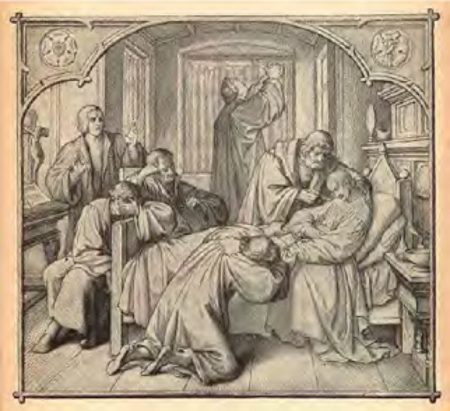
In 1535, an old friend of Martin Luther – his barber, in fact, a man named Peter Beskendorf – asked Luther for counsel concerning prayer. How could he deepen his prayer life? How could he pray effectively, and keep things fresh along the way?
Luther responded with a little treatise titled, How One Should Pray, for Master Peter the Barber. The booklet is simple and straightforward, full of practical pastoral advice. It presents Christian prayer as a wonderful gift – and a discipline, too.
Luther reminded his friend that “the flesh and the devil” look for every opportunity “to impede and obstruct prayer.” “Other tasks or thoughts” may crowd into our minds, Luther explained, and steal away our attention. We may think of “milking the cows” or “unhitching the horses” – or maybe checking our email. Our prayers may become “cool and joyless,” as sometimes happened to the Great Reformer himself. Then Luther reported, “I take my little Psalter, and hurry to my room.” And there he prayed “just as a child might do.”
Luther prepared for his prayers in a disciplined sort of way, yet not by screwing up his resolve or guilting his wandering mind into submission. He prepared by immersing himself in the Scriptures. “I say quietly to myself and word-for-word the Ten Commandments, the Creed, and, if I have time, some words of Christ or of Paul, or some psalms.” When his “heart has been warmed by such recitation,” he would “kneel or stand” and “speak or think” his prayers.
Luther advised his friend “to let prayer be the first business of the morning and the last at night. Guard yourself carefully against those false, deluding ideas which tell you, ‘Wait a little while. I will pray in an hour; first I must attend to this or that.’ Such thoughts get you away from prayer into other affairs which so hold your attention and involve you that nothing comes of prayer for that day.” Prayer should be our first order of business, in Luther’s estimation. We should not “imagine other works to be necessary which, after all, are nothing of the kind.”
This is good advice for praying barbers. It is good advice for missionaries, too.
Like praying people everywhere, missionary pray-ers are easily distracted. “The devil who besets us is not lazy or careless,” Luther reminds us, “and our flesh is too ready and eager to sin and is disinclined to the spirit of prayer.” We may think of our email – or maybe even “milking the cows.” And sometimes we are distracted by more “spiritual” things. Maybe a meeting at church. Maybe a sermon to prepare. Maybe, even, we have some witnessing to do, or some other pressing “spiritual” activity. “Wait a little while. I will pray in an hour; first I must attend to this or that.” Then we should “take out our Bibles and hurry to our rooms.”
Take out Genesis 12:1-3, for example. Read the passage “word-for-word,” as Luther recommended. Soak in it for a while. God chooses his servant Abraham; God promises to bless him; God intends that Abraham’s blessing reach “all the families of the earth.”
Try Psalm 96, for example. All the earth and all of its people are to “sing to the Lord a new song;” God’s own people must call the nations to join the melody.
Take the Great Commission of Jesus (Matthew 28:16-20). Read the passage “word-for-word.” The disciples worshipped the risen Lord; in the encounter they were commissioned; in the commission they were promised his gracious provision “to the close of the age.”
Or take a passage from Paul or John, such as Romans 10 or Revelation 7:9-12. “Use [the Scripture] as flint and steel to kindle a flame in the heart,” as Luther advised his friend Peter.
Then set aside some time – Luther recommended a morning hour. With Psalter or Catechism before you, or maybe the Newsletter that you have in your hand, sit down to pray things through, item by item. Luther suggested that we should not “undertake all of this or so much that one becomes weary in spirit.” Our prayers should not be “lengthy or drawn out, but frequent and ardent,” the Reformer advised. “It is enough to consider one section or half a section which kindles a fire in the heart.” And then, of course, you may begin again.
(Download a copy of Luther’s booklet on our website. Watch for more about Luther’s counsel next month…)